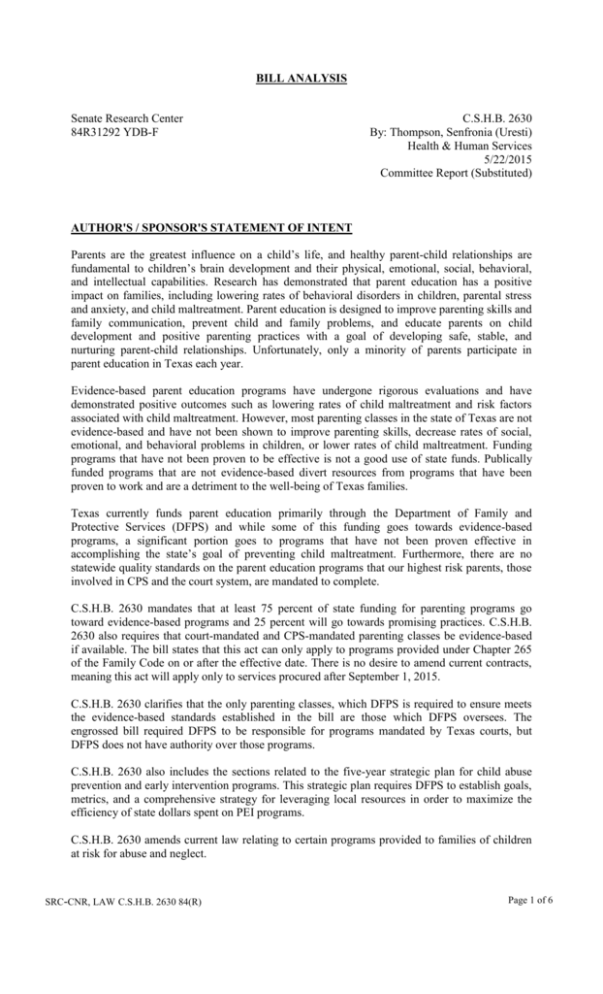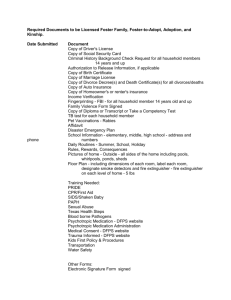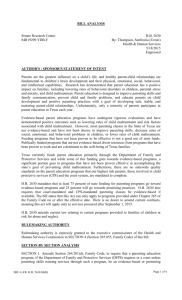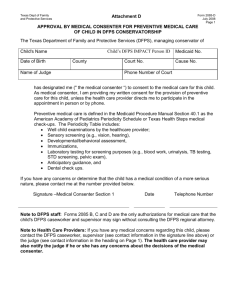BILL ANALYSIS - Texas Legislature Online
advertisement

BILL ANALYSIS Senate Research Center 84R31292 YDB-F C.S.H.B. 2630 By: Thompson, Senfronia (Uresti) Health & Human Services 5/22/2015 Committee Report (Substituted) AUTHOR'S / SPONSOR'S STATEMENT OF INTENT Parents are the greatest influence on a child’s life, and healthy parent-child relationships are fundamental to children’s brain development and their physical, emotional, social, behavioral, and intellectual capabilities. Research has demonstrated that parent education has a positive impact on families, including lowering rates of behavioral disorders in children, parental stress and anxiety, and child maltreatment. Parent education is designed to improve parenting skills and family communication, prevent child and family problems, and educate parents on child development and positive parenting practices with a goal of developing safe, stable, and nurturing parent-child relationships. Unfortunately, only a minority of parents participate in parent education in Texas each year. Evidence-based parent education programs have undergone rigorous evaluations and have demonstrated positive outcomes such as lowering rates of child maltreatment and risk factors associated with child maltreatment. However, most parenting classes in the state of Texas are not evidence-based and have not been shown to improve parenting skills, decrease rates of social, emotional, and behavioral problems in children, or lower rates of child maltreatment. Funding programs that have not been proven to be effective is not a good use of state funds. Publically funded programs that are not evidence-based divert resources from programs that have been proven to work and are a detriment to the well-being of Texas families. Texas currently funds parent education primarily through the Department of Family and Protective Services (DFPS) and while some of this funding goes towards evidence-based programs, a significant portion goes to programs that have not been proven effective in accomplishing the state’s goal of preventing child maltreatment. Furthermore, there are no statewide quality standards on the parent education programs that our highest risk parents, those involved in CPS and the court system, are mandated to complete. C.S.H.B. 2630 mandates that at least 75 percent of state funding for parenting programs go toward evidence-based programs and 25 percent will go towards promising practices. C.S.H.B. 2630 also requires that court-mandated and CPS-mandated parenting classes be evidence-based if available. The bill states that this act can only apply to programs provided under Chapter 265 of the Family Code on or after the effective date. There is no desire to amend current contracts, meaning this act will apply only to services procured after September 1, 2015. C.S.H.B. 2630 clarifies that the only parenting classes, which DFPS is required to ensure meets the evidence-based standards established in the bill are those which DFPS oversees. The engrossed bill required DFPS to be responsible for programs mandated by Texas courts, but DFPS does not have authority over those programs. C.S.H.B. 2630 also includes the sections related to the five-year strategic plan for child abuse prevention and early intervention programs. This strategic plan requires DFPS to establish goals, metrics, and a comprehensive strategy for leveraging local resources in order to maximize the efficiency of state dollars spent on PEI programs. C.S.H.B. 2630 amends current law relating to certain programs provided to families of children at risk for abuse and neglect. SRC-CNR, LAW C.S.H.B. 2630 84(R) Page 1 of 6 RULEMAKING AUTHORITY Rulemaking authority is expressly granted to the executive commissioner of the Health and Human Services Commission in SECTION 7 (Section 265.105, Family Code) of this bill. Rulemaking authority previously granted to the Texas Board of Human Services and Children's Trust Fund of Texas Council is rescinded in SECTION 8 (Section 40.0523, Human Resources Code) of this bill. SECTION BY SECTION ANALYSIS SECTION 1. Amends Section 264.201(d), Family Code, to require that a parenting education program, if the Department of Family and Protective Services (DFPS) requires or a court orders parenting skills training services through such a program, be an evidence-based or promising practice parenting education program described by Section 265.051 that is provided in the community in which the family resides, if available. SECTION 2. Amends Chapter 265, Family Code, by designating Sections 265.001, 265.002, 265.003, and 265.004 as Subchapter A and adding a subchapter heading to read as follows: SUBCHAPTER A. PREVENTION AND EARLY INTERVENTION SERVICES SECTION 3. Amends Section 265.004, Family Code, by amending Subsection (a) and adding Subsections (a-1) and (a-2), as follows: (a) Requires DFPS, to the extent that money is appropriated for the purpose, to fund evidence-based programs, including parenting education, home visitation, family support services, mentoring, positive youth development programs, and crisis counseling, offered by community-based organizations that are designed to prevent or ameliorate child abuse and neglect. Authorizes the programs funded under this subsection to be offered by a child welfare board established under Section 264.005 (County Child Welfare Boards), a local governmental board granted the powers and duties of a child welfare board under state law, a children's advocacy center established under Section 264.402 (Establishment of Children’s Advocacy Center), or other persons determined appropriate by DFPS. Makes a conforming change. (a-1) Requires DFPS to ensure that not less than 75 percent of the money appropriated for parenting education programs under Subsection (a) funds evidence-based programs described by Section 265.051(b) and that the remainder of that money funds promising practice programs described by Section 265.101(c). (a-2) Requires DFPS to actively seek and apply for any available federal funds to support parenting education programs provided under this section. SECTION 4. Amends Subchapter A, Chapter 265, Family Code, as added by this Act, by adding Section 265.005, as follows: Sec. 265.005. STRATEGIC PLAN. (a) Requires DFPS to develop and implement a fiveyear strategic plan for prevention and early intervention services. Requires DFPS, not later than September 1 of the last fiscal year in each five-year period, to issue a new strategic plan for the next five fiscal years beginning with the following fiscal year. (b) Requires that a strategic plan under this section: (1) identify methods to leverage other sources of funding or provide support for existing community-based prevention efforts; (2) include a needs assessment that identifies programs to best target the needs of the highest risk populations and geographic areas; SRC-CNR, LAW C.S.H.B. 2630 84(R) Page 2 of 6 (3) identify the goals and priorities for DFPS's overall prevention efforts; (4) report the results of previous prevention efforts using available information in the plan; (5) identify additional methods of measuring program effectiveness and results or outcomes; (6) identify methods to collaborate with other state agencies on prevention efforts; and (7) identify specific strategies to implement the plan and to develop measures for reporting on the overall progress toward the plan's goals. (c) Requires DFPS to coordinate with interested parties and communities in developing the strategic plan under this section. (d) Requires DFPS to annually update the strategic plan developed under this section. (e) Requires DFPS to post the strategic plan developed under this section and any update to the plan on its Internet website. SECTION 5. Transfers Subchapter D, Chapter 40, Human Resources Code, as amended by S.B. 219, Acts of the 84th Legislature, Regular Session, 2015, to Chapter 265, Family Code, redesignates it as Subchapter B, Chapter 265, Family Code, and amends it, as follows: SUBCHAPTER B. CHILD ABUSE AND NEGLECT PRIMARY PREVENTION PROGRAMS Sec. 265.051. DEFINITIONS. Redesignates existing Section 40.101, Human Resources Code, as Section 265.051, Family Code. Makes no further change to this section. Sec. 265.052. CHILD ABUSE AND NEGLECT PRIMARY PREVENTION PROGRAMS. Redesignates existing Section 40.102, Human Resources Code, as Section 265.052, Family Code. Makes no further change to this section. Sec. 265.053. ADMINISTRATIVE AND OTHER COSTS. Redesignates existing Section 40.104, Human Resources Code, as Section 265.053, Family Code. Makes no further change to this section. Sec. 265.054. CHILD ABUSE AND NEGLECT PREVENTION TRUST FUND ACCOUNT. Redesignates existing Section 40.105, Human Resources Code, as Section 265.054, Family Code. Makes a nonsubstantive change to this section. Sec. 265.055. DEPARTMENT OPERATING FUND ACCOUNT. Redesignates existing Section 40.106, Human Resources Code, as Section 265.055, Family Code. Makes a nonsubstantive change to this section. Sec. 265.056. CONTRIBUTIONS. Redesignates existing Section 40.107, Human Resources Code, as Section 265.056, Family Code. Makes no further change to this section. SECTION 6. Transfers Section 40.0561, Human resources Code, to Subchapter B, Chapter 265, Family Code, as transferred and redesignated from Subchapter D, Chapter 40, Human Resources Code, by his Act, and redesignates it as Section 265.057, Family Code, as follows: Sec. 265.057. COMMUNITY YOUTH DEVELOPMENT GRANTS. Redesignates existing Section 40.0561, Human Resources Code, as Section 265.057, Family Code. Makes no further change to this section. SRC-CNR, LAW C.S.H.B. 2630 84(R) Page 3 of 6 SECTION 7. Amends Chapter 265, Family Code, by adding Subchapter C, as follows: SUBCHAPTER C. PARENTING EDUCATION Sec. 265.101. PARENTING EDUCATION PROGRAMS. (a) Requires that a parenting education program provided by DFPS be an evidence-based program or a promising practice program described by this section. (b) Provides that an evidence-based program is a parenting education program that: (1) is research-based and grounded in relevant, empirical knowledge and program-determined outcomes; (2) has comprehensive standards ensuring the highest quality service delivery with continuous improvement in the quality of service delivery; (3) has demonstrated significant positive short-term and long-term outcomes; (4) has been evaluated by at least one rigorous, random, controlled research trial across heterogeneous populations or communities with research results that have been published in a peer-reviewed journal; (5) substantially complies with a program manual or design that specifies the purpose, outcomes, duration, and frequency of the program services; and (6) employs well-trained and competent staff and provides continual relevant professional development opportunities to the staff. (c) Provides that a promising practice program is a parenting education program that: (1) has an active impact evaluation program or demonstrates a schedule for implementing an active impact evaluation program; (2) has been evaluated by at least one outcome-based study demonstrating effectiveness or random, controlled trial in a homogeneous sample; (3) substantially complies with a program manual or design that specifies the purpose, outcomes, duration, and frequency of the program services; (4) employs well-trained and competent staff and provides continual relevant professional development opportunities to the staff; and (5) is research-based and grounded in relevant, empirical knowledge and program-determined outcomes. Sec. 265.102. OUTCOMES OF EVIDENCE-BASED PARENTING EDUCATION. Requires DFPS to ensure that a parenting education program provided under this chapter achieves favorable behavioral outcomes in at least two of the following areas: (1) improved cognitive development of children; (2) increased school readiness of children; (3) reduced child abuse, neglect, and injury; (4) improved child safety; SRC-CNR, LAW C.S.H.B. 2630 84(R) Page 4 of 6 (5) improved social-emotional development of children; (6) improved parenting skills, including nurturing and bonding; (7) improved family economic self-sufficiency; (8) reduced parental involvement with the criminal justice system; and (9) increased paternal involvement and support. Sec. 265.103. EVALUATION OF EVIDENCE-BASED PARENTING EDUCATION. (a) Requires DFPS to adopt outcome indicators to measure the effectiveness of parenting education programs provided under this chapter in achieving desired outcomes. (b) Authorizes DFPS to work directly with the model developer of a parenting education program to identify appropriate outcome indicators for the program and to ensure that the program substantially complies with the model. (c) Requires DFPS to develop internal processes to share information with parenting education programs to assist DFPS in analyzing the performance of the programs. (d) Requires DFPS to use information obtained under this section to monitor parenting education programs, continually improve the quality of the programs, and evaluate the effectiveness of the programs. Sec. 265.1035. INITIAL REPORT. (a) Requires DFPS, not later than December 1, 2016, to prepare and submit a report on state-funded parenting education programs to the standing committees of the senate and house of representatives with jurisdiction over child protective services. (b) Requires that the report submitted under this section include the status and a description of the parenting education programs implemented and a description of the models associated with the programs and information on the number of families served by the programs, including their demographic information. (c) Provides that this expires January 1, 2017. Sec. 265.104. REPORTS TO LEGISLATURE. (a) Requires DFPS, not later than December 1 of each even-numbered year, to prepare and submit a report on state-funded parenting education programs to the standing committees of the senate and house of representatives with jurisdiction over child protective services. (b) Requires that a report submitted under this section include: (1) a description of the parenting education programs implemented and of the models associated with the programs; (2) information on the families served by the programs, including the number of families served and their demographic information; (3) the goals and achieved outcomes of the programs; (4) information on the cost for each family served, including any available third-party return-on-investment analysis; and (5) information explaining the percentage of money spent on evidencebased programs and on promising practice programs. SRC-CNR, LAW C.S.H.B. 2630 84(R) Page 5 of 6 Sec. 265.105. RULES. Authorizes the executive commissioner of the Health and Human Services Commission to adopt rules as necessary to implement this subchapter. SECTION 8. Repealer: Section 40.0523 (Infant Mortality Prevention Education Program), Human Resources Code, as amended by S.B. 219, Acts of the 84th Legislature, Regular Session, 2015. SECTION 9. Provides that the changes in law made by this Act apply only to a program provided under Chapter 265 (Prevention and Early Intervention Services), Family Code, on or after the effective date of this Act. SECTION 10. Requires DFPS, not later than September 1, 2016, to adopt the initial strategic plan required by Section 265.005, Family Code, as added by this Act. SECTION 11. Effective date: September 1, 2015. SRC-CNR, LAW C.S.H.B. 2630 84(R) Page 6 of 6







